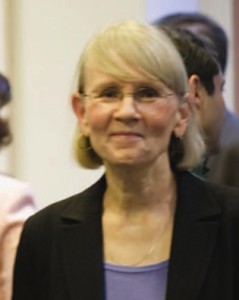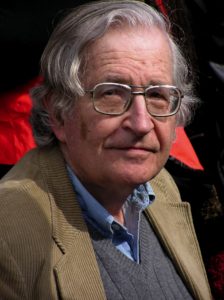Patricia Rodrigues Samora ~ Is This The End Of Slum Upgrading In Brazil?
 In Brazil’s ongoing economic and political drama, one of the latest developments is a congressional proposal to freeze federal funds at 2016 levels, adjusting the 2017 national budget only for inflation. This move would mean deep cuts to spending on social programnes.
In Brazil’s ongoing economic and political drama, one of the latest developments is a congressional proposal to freeze federal funds at 2016 levels, adjusting the 2017 national budget only for inflation. This move would mean deep cuts to spending on social programnes.
Though such reductions would affect programmes that launched millions of Brazilians into the middle class and put the developing country on track to meet many of the Millennium Development Goals, the senate seems likely to approve the budget freeze.
For Brazilian cities, this government belt-tightening promises a disquieting change: the possible end of the country’s ambitious slum-upgrading programs. Despite Brazil’s great wealth, many poor neighbourhoods known as favelas (slums or “informal settlements” in urban planning parlance) still struggle with inadequate construction quality, no sanitation, environmental risk factors and lack of the most basic infrastructure.
Read more: http://www.huffingtonpost.com/is-this-the-end-of-slum
How Do We Prepare The Next Generation Of Citizens?
“College and career readiness” is the objective American educators are focused on these days, and it’s one both students and their parents will approve. Both want assurance that the cost and rigors of getting into and through college will pay off as a sure ticket to life success. A recent Harvard poll showed achieving this personal success to be the number one concern of today’s youth, and parents are likely glad to know. The broader purposes once associated with higher education have taken a back seat as college increasingly becomes a strict means to an end.
An initiative introduced recently at a premier suburban public high school in the US Northeast seems well aligned with this focus. Taking advantage of now widely available technology, beginning in 9th grade students are required to begin a “digital portfolio project” to “track their accomplishments throughout their high school careers and choose how the world perceives them.” Student reactions are reported to be positive. One spoke of it as an opportunity to set new goals for herself and a good reflection of what she achieves over the next four years. Another said it will be a good tool, especially for college applications. Instituting this future-oriented focus early on will perhaps be useful in helping teens to construct an identity and succeed in communicating it to others who can acknowledge and validate it, rather than postpone this task to the extended adolescence now frequent among twenty-somethings.
Yet absent from this focus is another dimension of preparing for adulthood, one that extends beyond individual success, to collective prosperity. It’s one long regarded as a central aim of education in a democracy – preparation for citizenship. A US election year reminds Americans of its significance. The American president elected this year will likely still be in office when today’s high schoolers begin their adult lives. Is establishing a personal identity and life trajectory enough to prepare them sufficiently for responsible citizenship under this president in their increasingly troubled nation and world?
A cursory look at the current political climate could be seen as reassuring in this regard. Although a segment of the citizenry lament the emphasis of image over ideas, modern media provide us a never before known opportunity to get to know the candidates, up close and personal. Candidates are well aware of their need for a skilled team to project a carefully shaped and managed image – their life story, the experience they bring to the job, and, most important, what kind of person they truly are. Above all, this image must portray them as personable and likeable, appealing to many.
Possibly, then, beginning as a young teen to shape one’s image and even to communicate it effectively in modern digital form is not far off the mark. Many of the teens afforded this opportunity aspire to leadership roles, and they are getting a head start in projecting who they are. They are learning the art and craft of branding and promoting a self.
Another view is that this accomplishment falls short and that we can and must do a good deal more if we wish to prepare our youth as citizens, ready to act in a democratic society that depends on their contribution. More than a few observers today find the level of discourse of the presidential candidates unsatisfying. There is a range, of course, from Trump at one extreme (“Look who I am”) to Sanders (“Here’s what we must do”) at the other. Yet, most of us, given the choice, would prefer all candidates, as a matter of course, to debate ideas rather than merely project images and for citizens to cast their votes based on these ideas.
If so, it is our responsibility to prepare our youth to become citizens who will have the vision and will to transform this preference into a reality. If we want people to think and talk about ideas, and solutions, we need from early on to afford them extended practice in doing so. There is of course a significant segment of the adult population who want their youth to consider only those ideas these adults themselves subscribe to. Yet, in work my colleagues and I have undertaken using modern technology to engage middle- and high-school students in electronic dialogs with peers on controversial social issues, we have found them keen to contemplate such issues at length with multiple partners, culminating in their writing individual “Letters to the Editor” position statements on them. Abortion is a topic they most frequently want to address, among numerous others such as foreign aid and criminal justice. Their initial ideas are often naïve and narrow, but that changes as they confront and respond to others’ ideas and examine evidence that bears on them. Some, for example, propose that instead of testing new drugs on animals, it would be better to use human prisoners since they are guilty and animals are innocent. With deliberation such ideas in time self-correct. Students also gain awareness of issues worth talking about. When we asked young teens in a New York City low-income school what the most important issues were that the new president will have to address, all but a very few mentioned just two, homelessness and stealing.
Although there are signs of change, peer discourse has never found much of a place in the American middle- or high-school curriculum. If students talk at all, it is in response to a teacher’s question, hoping to get the “right” answer. The social studies curriculum would seem the natural place for students to debate issues of current concern to the society they live in, but doing so is largely crowded out by an established curriculum designed to insure students know the history of their country, state, and city and the structure of these respective governments. We know not much of this information sticks. A recent video on Facebook showed American college students clueless when asked who won the civil war (yet all were successful in naming Brad Pitt’s present and former spouse).
Only belatedly, likely at the end of a term with time running out, do curriculum standards propose students be asked to consider the future – how what existed in the past or exists at present might change. New York State curriculum standards for social studies, for example, at the end of its comprehensive guidelines for American history, conclude with a brief section titled, “The US begins a new century.” The new century, the standards suggest, offers an opportunity for “federal and state governments to reevaluate their roles,” and it is recommended that students contemplate these. The particulars listed under this heading are wide-ranging – “fiscal and monetary policies: taxation, regulation, deregulation” and “social programs: health, welfare, education.” The topic of reevaluating government’s role is a quite different topic than the descriptive historical topics that precede them in this and similar curriculum guides. “Teaching the future,” rather than only the past, calls for a different kind of intellectual engagement. It demands envisioning and weighing possibilities – what could be, rather than only what is or was.
Little in students’ school experience prepares them to shift gears to engage in this kind of thought, individually or with peers. If we believe it important that 21st century citizens be able and disposed to think in such ways, we must provide the opportunities that will prepare them, whether or not such thinking fits today’s culture.
—
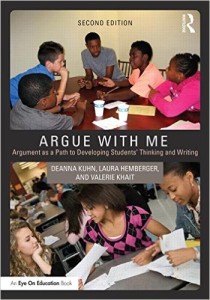 Deanna Kuhn is professor of psychology and education at Teachers College Columbia University. She holds a Ph.D. from University of California, Berkeley, in developmental psychology. She has been editor of the journal Cognitive Development, editor of the journal Human Development, and co-editor of the last two editions of the Cognition, Perception and Language volume of the Handbook of Child Psychology. She has published widely in psychology and education, in journals ranging from Psychological Review to Harvard Educational Review. She is an author of 4 major books — The development of scientific thinking skills, The skills of argument, Education for thinking, and, most recently, Argue with me: Argument as a path to developing students’ thinking and writing (Routledge, 2016). Her research is devoted to identifying and determining how best to nurture the intellectual skills that will prepare young people for lifelong learning, work, and citizenship.
Deanna Kuhn is professor of psychology and education at Teachers College Columbia University. She holds a Ph.D. from University of California, Berkeley, in developmental psychology. She has been editor of the journal Cognitive Development, editor of the journal Human Development, and co-editor of the last two editions of the Cognition, Perception and Language volume of the Handbook of Child Psychology. She has published widely in psychology and education, in journals ranging from Psychological Review to Harvard Educational Review. She is an author of 4 major books — The development of scientific thinking skills, The skills of argument, Education for thinking, and, most recently, Argue with me: Argument as a path to developing students’ thinking and writing (Routledge, 2016). Her research is devoted to identifying and determining how best to nurture the intellectual skills that will prepare young people for lifelong learning, work, and citizenship.
Personal website: http://www.educationforthinking.org/
Native American Activism: 1960s To Today
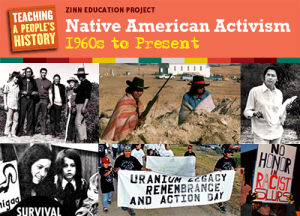 The month of November is often the only time students learn about Native Americans, and usually in the past tense or as helpless “wards of the state.” To counter this, we offer this collection of recent Native movements and activists who have continued to struggle for sovereignty, dignity, and justice for their communities. The financial and colonial drive that usurps Native peoples ways of life is not just relegated to the past; it continues today. Here are just a few stories of struggle and achievement since the late 1960s.
The month of November is often the only time students learn about Native Americans, and usually in the past tense or as helpless “wards of the state.” To counter this, we offer this collection of recent Native movements and activists who have continued to struggle for sovereignty, dignity, and justice for their communities. The financial and colonial drive that usurps Native peoples ways of life is not just relegated to the past; it continues today. Here are just a few stories of struggle and achievement since the late 1960s.
For Native American Heritage Month (and beyond), view lessons and resources at the Zinn Education Project.
Read more: http://zinnedproject.org/native-american-activism-1960s-to-today/
‘Aan deze zijde van de utopie’ ~ De wijsgerige antropologie van Helmuth Plessner
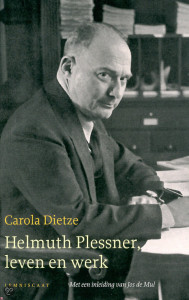 Wie een thuis zoekt, een vaderland, geborgenheid, moet zich uitleveren aan het geloof. Maar wie vasthoudt aan de geest, keert niet terug. Telkens weer zijn andere ogen nodig om op een andere manier zichtbaar te maken wat allang gezien, maar niet bewaard kon blijven. ~ Helmuth Plessner
Wie een thuis zoekt, een vaderland, geborgenheid, moet zich uitleveren aan het geloof. Maar wie vasthoudt aan de geest, keert niet terug. Telkens weer zijn andere ogen nodig om op een andere manier zichtbaar te maken wat allang gezien, maar niet bewaard kon blijven. ~ Helmuth Plessner
De afgelopen decennia laten een groeiende belangstelling zien voor het werk van de Duitse bioloog, filosoof en socioloog Helmuth Plessner (1892–1985). De organisatoren van het eerste Internationale Plessner Congress, dat in 2000 in Freiburg plaatsvond, durfden zelfs te spreken van een Plessner Renaissance. Misschien is dat enigszins ongelukkig uitgedrukt, omdat eigenlijk alleen van een wedergeboorte gesproken kan worden in Duitsland en Nederland, de twee landen waarin hij werkzaam is geweest. Buiten deze beide landen is het werk van Plessner tijdens diens leven vrijwel onopgemerkt gebleven, zodat daar eerder gesproken moet worden van een late geboorte van een Plessner-receptie. En zelfs in Duitsland en Nederland, waar Plessner een zekere bekendheid verwierf als een van de grondleggers en belangrijkste vertegenwoordigers van de twintigste-eeuwse wijsgerige antropologie en ook als een scherpzinnig interpreet van de ideeënhistorische wortels van het nationaalsocialisme, heeft zijn werk altijd in de schaduw gestaan van zijn tijdgenoot Martin Heidegger (1889-1976).
Voor het aanvankelijk uitblijven van een omvangrijke werkingsgeschiedenis van Plessners gedachtegoed zijn meerdere redenen te noemen. In de eerste plaats is er nog maar weinig vertaald van zijn omvangrijke oeuvre, waarvan een substantieel deel tussen 1980 en 1985 door Suhrkamp is uitgebracht onder de titel Gesammelte Schriften in 10 Bänden.[i] Bovendien zijn, met uitzondering van de Nederlandse, de meeste van deze vertalingen (in het Italiaans, Nederlands, Engels, Spaans, Frans, Pools en Russisch) van recente datum, en dan gaat het voornamelijk om artikelen en andere kleine geschriften.[ii] Zijn omvangrijke filosofische hoofdwerk, Die Stufen des Organischen und der Mensch (1928), is tot op heden onvertaald gebleven (hoewel er al enige tijd een Engelse vertaling in de maak is).
Dat zijn omvangrijke oeuvre tot dusver te weinig aandacht heeft gekregen, komt ook doordat Plessner na de machtsovername door Hitler als Halbjude zijn universitaire lesbevoegdheid in Duitsland verloor en van 1933 tot 1952 – met uitzondering van de jaren tussen 1943 en 1945, waarin hij als onderduiker op verschillende adressen in Utrecht en Amsterdam verbleef – werkzaam was in Groningen, eerst als buitengewoon hoogleraar sociologie en later als hoogleraar filosofie. Deze bijzondere omstandigheden hebben ertoe bijgedragen dat hij aanvankelijk nauwelijks school heeft gemaakt. En voor zover Plessner zelf deel uitmaakte van een filosofische ‘school’ – die van de wijsgerige antropologie[iii] – werd de praktische samenwerking met de twee belangrijkste mederepresentanten, Max Scheler (1874-1928) en Arnold Gehlen (1904-1976), verhinderd door respectievelijk een verstoorde persoonlijke verhouding en een tegengestelde politieke ideologie.
Met dat laatste hangt wellicht de derde reden samen voor de vertraagde receptie van Plessners werk. Zijn bereidheid om zijn eigen denken altijd weer kritisch te blijven bezien, viel op een weinig vruchtbare bodem in een eeuw die bijzonder vatbaar was voor totalitaire verleiding. Waar tijdgenoten als Heidegger en Gehlen de totalitaire ideologie van het nationaalsocialisme omarmden, belichaamt Plessners werk een radicale scepsis ten aanzien van iedere totalitaire ideologie.
Een dergelijke scepsis heeft ook aan het begin van de eenentwintigste eeuw nog niets aan betekenis verloren. In dat licht bezien komt de historische biografie van Carola Dietze als geroepen. Plessners persoonlijkheid, biografie en werk zijn namelijk nauw met elkaar verbonden. Het duidelijkst komt dat tot uitdrukking in zijn politiek gemotiveerde geschriften. Zijn pleidooi voor een open pluralistische samenleving in Grenzen der Gemeinschaft: Eine Kritik des sozialen Radikalismus (1924) vormt een reactie op de overspannen utopische gemeenschapsidealen die in de Weimar-republiek zowel door rechts – de national-völkische beweging – als links – de communisten – werden uitgedragen. En in het in Groningen geschreven en in Zürich gepubliceerde Das Schicksal deutschen Geistes im Ausgang seiner bürgerlichen Epoche (1935, in 1959 in een uitgebreidere editie heruitgegeven onder de titel Die Verspätete Nation: Über die politische Verführbarkeit bürgerlichen Geistes) analyseert hij de religieuze, sociale en filosofische wortels van het nationaalsocialisme, de beweging die hem veroordeelde tot het bestaan van politiek vluchteling. Read more
Noam Chomsky On The Perils Of Market-Driven Education
Throughout most of the modern period, beginning with the era known as the Enlightenment, education was widely regarded as the most important asset for the building of a decent society. However, this value seems to have fallen out of favor in the contemporary period, perhaps as a reflection of the dominance of the neoliberal ideology, creating in the process a context where education has been increasingly reduced to the attainment of professional, specialized skills that cater to the needs of the business world.
What is the actual role of education and its link to democracy, to decent human relations and to a decent society? What defines a cultured and decent society? World-renowned linguist, social critic and activist Noam Chomsky shares his views on education and culture in this exclusive interview for Truthout.
C. J. Polychroniou: At least since the Enlightenment, education has been seen as one of the few opportunities for humanity to lift the veil of ignorance and create a better world. What are the actual connections between democracy and education, or are those links based mainly on a myth, as Neil Postman argued in The End of Education?
Noam Chomsky: I don’t think there is a simple answer. The actual state of education has both positive and negative elements, in this regard. An educated public is surely a prerequisite for a functioning democracy — where “educated” means not just informed but enabled to inquire freely and productively, the primary end of education. That goal is sometimes advanced, sometimes impeded, in actual practice, and to shift the balance in the right direction is a major task — a task of unusual importance in the United States, in part because of its unique power, in part because of ways in which it differs from other developed societies.
It is important to remember that although the richest country in the world for a long time, until World War II, the US was something of a cultural backwater. If one wanted to study advanced science or math, or to become a writer and artist, one would often be attracted to Europe. That changed with World War II for obvious reasons, but only for part of the population. To take what is arguably the most important question in human history, how to deal with climate change, one impediment is that in the US, 40 percent of the population sees it as no problem because Christ will return within the next few decades — symptomatic of many other pre-modern features of the society and culture.
Much of what prevails in today’s world is market-driven education, which is actually destroying public values and undermining the culture of democracy with its emphasis on competition, privatization and profit-making. As such, what model of education do you think holds the best promise for a better and peaceful world?
In the early days of the modern educational system, two models were sometimes counterposed. Education could be conceived as a vessel into which one pours water — and a very leaky vessel, as we all know. Or it could be thought of as a thread, laid out by the instructor along which students proceed in their own ways, developing their capacities to “inquire and create” — the model advocated by Wilhelm von Humboldt, the founder of the modern university system. Read more
Andrew Kahn & Jamelle Bouie ~ The Atlantic Slave Trade In Two Minutes
Usually, when we say “American slavery” or the “American slave trade,” we mean the American colonies or, later, the United States. But as we discussed in Episode 2 of Slate’s History of American Slavery Academy, relative to the entire slave trade, North America was a bit player. From the trade’s beginning in the 16th century to its conclusion in the 19th, slave merchants brought the vast majority of enslaved Africans to two places: the Caribbean and Brazil. Of the more than 10 million enslaved Africans to eventually reach the Western Hemisphere, just 388,747—less than 4 percent of the total—came to North America. This was dwarfed by the 1.3 million brought to Spanish Central America, the 4 million brought to British, French, Dutch, and Danish holdings in the Caribbean, and the 4.8 million brought to Brazil.
Read more: http://www.slate.com/the_history_of_the_atlantic_slave_trade.html


